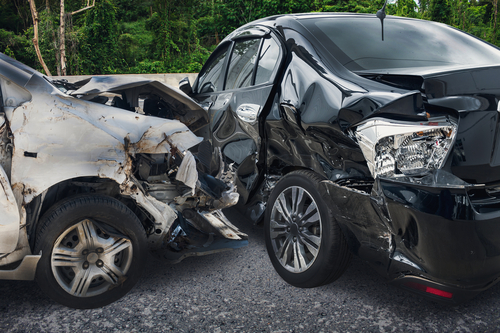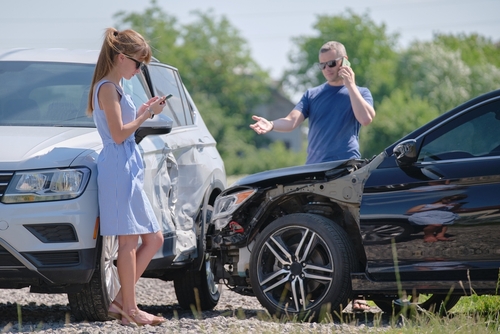When someone causes a car crash in Tampa that hurts you or a loved one, you need a skilled Tampa car accident lawyer to explain your options for obtaining compensation and help you navigate the process.
The Florida personal injury attorneys at Hancock Injury Attorneys have fought for accident victims' rights for over 30 years. Our experienced car accident lawyers are dedicated to helping you get the full compensation you deserve.
Contact our Tampa office today for a free consultation at (813) 915-1110.
Tampa Car Accident Guide
Why Choose Hancock Injury Attorneys for Your Tampa Car Accident Case?
At Hancock Injury Attorneys, we offer over 30 years of experience handling car accident claims. We've recovered millions for injured clients and provide personal attention from a senior attorney on every case.
Our team is available 24/7 to answer your questions, and we work on a contingency fee basis, meaning you don't pay unless we win your case. With hundreds of 5-star client reviews, you can trust us to handle your claim.
Our office is situated near several local landmarks that make it easy to find. We're just a stone's throw away from the serene Dorset Lake, providing a calm environment for our clients as they face their legal challenges. Additionally, our proximity to Hamner Tower Park means we're in a great area well-known to many Tampa residents.
This strategic location allows us to be readily available to our clients throughout Tampa and the surrounding areas. Our office is easily reachable whether you're coming from downtown, the suburbs, or neighboring communities. We chose this location to ensure that quality legal representation is never far away when you need it most.
Don't face the aftermath of a serious car accident alone. Let our experienced Tampa car accident lawyers guide you through the legal process and fight for the full and fair compensation you deserve. Contact us today for a free, no-obligation consultation.
Compensation Available in Tampa Car Accident Cases
After an attorney helps you successfully navigate a Tampa car accident claim, you may be entitled to compensation for various types of damages, depending on the specifics of your case.
Economic Damages
These damages are meant to cover measurable financial losses resulting from the accident.
- Medical Expenses: Includes hospital bills, surgery costs, physical therapy, prescription medications, and any future medical treatments related to the accident.
- Lost Wages: Compensation for income lost due to time off work for recovery or medical appointments.
- Loss of Earning Capacity: If the accident impacts your ability to work in the future, you may be compensated for the loss of potential earnings.
- Property Damage: Covers the cost of repairing or replacing your vehicle and any other personal property damaged in the accident.
Non-Economic Damages
These damages address the intangible effects of the accident.
- Pain and Suffering: Compensation for physical pain and emotional distress caused by the accident.
- Emotional Distress: Includes psychological impacts such as anxiety, depression, or PTSD resulting from the accident.
- Loss of Enjoyment of Life: If the accident limits your ability to engage in hobbies, recreation, or other activities you previously enjoyed.
- Loss of Consortium: Compensation for the negative impact on relationships with a spouse or family member due to the accident.
Punitive Damages
In rare cases, punitive damages may be awarded if the at-fault party's behavior was particularly reckless or malicious, such as driving under the influence or engaging in road rage. These damages are meant to punish the wrongdoer and deter similar behavior.
Wrongful Death Damages
If the accident results in a fatality, surviving family members may seek compensation for:
- Funeral and burial expenses.
- Loss of financial support.
- Loss of companionship and guidance.
Comparative Negligence in Florida
Florida follows a modified comparative negligence rule, meaning your compensation may be reduced if you are found partially at fault for the accident. As of recent changes in Florida law, you must be less than 50% at fault to recover damages.
Steps to Maximize Compensation
To ensure you receive fair compensation, it's important to:
- Document the accident scene and gather evidence, such as photos, videos, and witness statements.
- Seek immediate medical attention, even if injuries seem minor.
- Retain all records related to medical treatment and financial losses.
- Consult a qualified personal injury attorney experienced in Tampa car accident cases.
Where Do Accidents Occur in Tampa?

As experienced Tampa car accident lawyers, we've seen firsthand how certain areas of our city can be particularly prone to traffic accidents. Understanding these high-risk locations can help drivers stay alert and potentially avoid dangerous situations.
Hillsborough Avenue And Sheldon Road
One of Tampa's most notorious accident spots is the intersection of Hillsborough Avenue and Sheldon Road. This busy crossroads sees a high volume of traffic daily, leading to frequent collisions, especially during rush hours.
Similarly, the stretch of Dale Mabry Highway between Columbus Drive and Hillsborough Avenue is often a hotspot for crashes due to its heavy traffic and numerous entry and exit points for businesses.
The Lee Roy Selmon Expressway
While designed to ease traffic flow, the Lee Roy Selmon Expressway has its share of accident-prone areas, particularly near the downtown exits, where merging traffic can create hazardous conditions. The I-4/I-275 interchange, locally known as "Malfunction Junction," is another area where accidents frequently occur due to complex traffic patterns and high-speed merges.
The Bay to Bay Boulevard and MacDill Avenue
In South Tampa, the Bay to Bay Boulevard and MacDill Avenue intersection has been identified as a high-risk area, especially for pedestrians and cyclists. Heavy traffic and active pedestrian zones make this area particularly challenging.
Busch Boulevard
Accidents are also common along Busch Boulevard, especially near the intersection with Nebraska Avenue. This area's mix of local and commuter traffic, combined with numerous businesses and entrances, creates a recipe for frequent fender-benders and more serious collisions.
Near The University of South Florida
Near the University of South Florida, Fowler Avenue sees its fair share of accidents, particularly around the busy retail areas and near the I-275 interchange. The high volume of student drivers and visitors unfamiliar with the area contributes to the accident rate here.
It's important to note that while these areas see frequent accidents, crashes can happen anywhere in Tampa. Factors like distracted driving, speeding, and impaired driving can turn any road into a danger zone.
If you've been involved in an accident in any of these areas or elsewhere in Tampa, the experienced team at Hancock Injury Attorneys is here to help. We know these roads, understand the local traffic patterns, and know how accidents in these areas typically unfold.
Types of Car Accident Cases We Handle

At Hancock Injury Attorneys, we represent clients injured in all types of car accidents in Tampa and throughout Florida. These include:
Rear-End Collisions
- Occur when one vehicle crashes into the back of another.
- Often caused by distracted driving, tailgating, or sudden braking.
- Common injuries include whiplash, back injuries, and head trauma.
Head-On Collisions
- Involve two vehicles crashing front-to-front.
- Often result in severe injuries or fatalities.
- Common causes include drunk driving, distracted driving, or driving the wrong way on a roadway.
T-Bone (Side-Impact) Accidents
- Happen when the front of one vehicle strikes the side of another, typically at intersections.
- Frequently caused by running red lights or stop signs, or failing to yield.
- Injuries can include broken bones, internal injuries, and head trauma.
Multi-Vehicle Accidents
- Also known as pile-ups, involve three or more vehicles.
- Often caused by chain reactions due to one driver’s negligence.
- Determining fault can be complex, requiring thorough investigation.
Rollover Accidents
- Occur when a vehicle tips over onto its side or roof.
- Common with SUVs or vehicles with a higher center of gravity.
- Often caused by speeding, sharp turns, or collisions.
Hit-and-Run Accidents
- When a driver flees the scene of an accident.
- Victims may need to rely on their own uninsured motorist coverage for compensation.
Drunk or Impaired Driving Accidents
- Caused by drivers under the influence of alcohol, drugs, or other substances.
- Often result in severe injuries or fatalities due to impaired reaction times and judgment.
Distracted Driving Accidents
- Include texting, talking on the phone, eating, or any other activity that diverts attention from driving.
- A leading cause of car accidents in Tampa and nationwide.
Uber, Lyft, and Rideshare Accidents
- Involve rideshare vehicles, with unique insurance and liability challenges.
- May require determining whether the driver was actively using the app during the accident.
Uninsured and Underinsured Motorist Claims
- Occur when the at-fault driver lacks sufficient insurance coverage.
- Victims may need to rely on their own UM/UIM coverage.
Road Hazard and Poor Maintenance Cases
- Caused by dangerous road conditions, such as potholes, poor signage, or defective traffic signals.
- Liability may rest with government entities or construction companies.

No matter what type of car accident you've been involved in, our skilled legal team can protect your rights and seek maximum compensation for your injuries and losses. We'll thoroughly investigate your crash, gather evidence to support your claim, and build a strong case on your behalf.
Common Car Accident Injuries
Car accidents can cause a wide range of injuries, varying in severity depending on the nature of the collision. Here are some of the most common injuries sustained in car accidents:
Head and Brain Injuries
- Concussions: Caused by the head hitting an object or from the brain being jostled inside the skull.
- Traumatic Brain Injuries (TBIs): Include severe brain injuries that can lead to long-term cognitive, emotional, and physical impairments.
- Skull Fractures: Resulting from high-impact collisions.
- Brain Bleeding or Swelling: Requires immediate medical attention.
Neck and Spine Injuries
- Whiplash: A common injury caused by the rapid back-and-forth motion of the head and neck during a collision.
- Herniated Discs: Damage to the spinal discs, causing pain and mobility issues.
- Spinal Cord Injuries: This may result in partial or complete paralysis.
- Cervical Fractures: Broken neck bones can lead to severe complications.
Back Injuries
- Sprains and Strains: Damage to the muscles and ligaments in the back.
- Compression Fractures: Small cracks in the vertebrae caused by forceful impact.
- Chronic Pain: Long-term pain issues may develop, requiring ongoing treatment.
Chest Injuries
- Broken Ribs: Caused by the force of impact or by seat belts.
- Internal Organ Damage: Injuries to the lungs, heart, or other organs due to blunt force trauma.
- Bruising: Often from the seatbelt or collision impact.
Abdominal and Internal Injuries
- Internal Bleeding: A life-threatening condition that requires immediate medical intervention.
- Organ Damage: Injuries to organs such as the liver, spleen, or kidneys.
Limb and Extremity Injuries
- Fractures: Broken arms, legs, wrists, and ankles are common.
- Dislocations: Joints such as shoulders or hips may be displaced due to the force of the collision.
- Lacerations and Cuts: Caused by broken glass, metal, or other debris.
Soft Tissue Injuries
- Sprains and Strains: Damage to muscles, ligaments, and tendons.
- Bruises and Contusions: Often occur from impacts with parts of the vehicle or seat belts.
Facial Injuries
- Cuts and Lacerations: From shattered glass or impact with the airbag, dashboard, or steering wheel.
- Fractures: Including broken noses, jaws, and cheekbones.
- Dental Injuries: Damage to teeth or gums.
Burns
- Caused by contact with hot surfaces, chemicals, or fires resulting from the crash.
- Burn injuries may range from minor to life-threatening.
Psychological Injuries
- Emotional Trauma: Such as anxiety, depression, or grief related to the accident.
- Post-Traumatic Stress Disorder (PTSD): Includes flashbacks, nightmares, and a reluctance to drive or ride in vehicles.
- Phobias: Fear of driving or being a passenger following a traumatic accident.
In cases of fatal accidents, the victims' families may suffer immense emotional and financial hardship. These cases typically fall under wrongful death claims.
Even seemingly minor injuries can have long-lasting effects on your health and well-being. Seek medical attention and legal guidance immediately after a car accident. Our experienced Tampa car accident attorneys will work closely with your medical providers to fully understand the extent of your injuries and ensure you receive proper compensation for all your damages.
Dealing with Insurance Companies After a Car Accident

After a car accident, you'll likely need to deal with insurance companies - both your own and the other drivers. While insurance adjusters may seem friendly and concerned about your well-being, their main priority is to minimize payouts and protect their company's bottom line. Insurance companies are businesses, and like any business, they aim to maximize profits, which usually means paying out as little as they can on claims.
The Insurance Company May Try To Devalue Your Claim
Insurance companies use different tactics to devalue or deny claims. One common strategy is pressuring you to give recorded statements shortly after the accident. They may claim this is a routine procedure, but in reality, they're hoping you'll say something that can be used against you later. You might inadvertently downplay your injuries or accept partial blame for the accident, statements that can significantly harm your claim.
Don't Fall For Lowball Settlements
Another tactic is offering quick, lowball settlements. These offers might seem tempting, especially when facing mounting medical bills and lost income. However, these initial offers are almost always far less than what your claim is truly worth. Insurance companies hope you'll accept this quick cash before fully understanding the extent of your injuries and long-term expenses.
Don't Let Insurers Downplay Your Injuries
Insurers may also try to downplay the severity of your injuries. They might argue that your injuries aren't as serious as you claim or don't warrant the level of treatment you're receiving. This is particularly common with injuries that aren't immediately visible, such as whiplash or traumatic brain injuries.
The Insurance Company May Try To Blame Your Pre-Existing Condition
Another common tactic is arguing that your injuries were pre-existing. If you have any history of back pain, for example, they might try to attribute your current back injury to this pre-existing condition rather than the accident. This is why it's best to have thorough medical documentation of your injuries and how they relate to the accident.
They May Try To Delay The Claims Process
Insurance companies also delay the claims process. They might drag out negotiations, request unnecessary documentation, or simply be slow to respond to communications. This tactic is designed to wear you down, hoping you'll eventually accept a lower settlement out of frustration or financial need.
Insurance Companies May Be Watching You
Some insurance companies may even resort to surveillance tactics, such as monitoring your social media accounts or hiring private investigators to observe your daily activities. They're looking for any evidence that can contradict your injury claims.
Having an experienced Tampa car accident lawyer on your side can level the playing field when dealing with insurance companies. At Hancock Injury Attorneys, we've seen these tactics time and time again, and we know how to counter them effectively. We understand the tricks and traps insurance adjusters use and are prepared to advocate on your behalf.
What to Do After a Car Accident in Tampa

The steps you take immediately following a car accident can greatly influence your ability to recover compensation.
If you're involved in a crash, check for injuries. Seeking prompt medical attention is advised, even if you don't think you're seriously hurt. Many injuries, such as whiplash, concussions, or internal injuries, may not show immediate symptoms but can get worse over time.
Don't Wait To Get Medical Care
Waiting too long for medical care can jeopardize your health and weaken your legal claim. Insurance companies may argue that your injuries weren't serious or weren't caused by the accident if you wait to see a doctor.
When you seek medical attention, be sure to tell your healthcare provider about all of your symptoms, no matter how minor they may seem. Follow all treatment recommendations and attend all follow-up appointments. This creates a clear medical record linking your injuries to the accident, which benefits your claim.
Report The Accident To Your Insurance Company
After seeking medical care, report the accident to your insurance company, but keep the conversation brief and stick to the basic facts. Avoid discussing fault or the extent of your injuries.
Avoid admitting fault or giving recorded statements to insurance companies before speaking with an attorney. Insurance adjusters may try to use your words against you to minimize your claim.

The skilled legal team at Hancock Injury Attorneys can guide you through the post-accident process and protect your rights every step of the way. We'll handle all communication with insurance companies on your behalf, ensuring that your interests are protected and you don't inadvertently say anything that can harm your case.
Remember, your health and legal rights are at stake. By seeking immediate medical attention and contacting an experienced car accident attorney promptly, you're taking important steps to protect your physical recovery and your ability to secure fair compensation for your injuries and losses.

Our experienced Tampa car accident attorneys can take the legal burden off your shoulders and fight for the full compensation you deserve. We can investigate your accident to determine liability, gather and preserve evidence to support your claim, handle all communication with insurance companies, work with medical experts to fully assess your injuries and future needs, calculate the true value of your claim, including long-term damages, negotiate aggressively for a fair settlement, and take your case to trial if necessary to secure maximum compensation.
Don't try to handle your car accident claim on your own. Insurance companies have teams of lawyers working to minimize payouts. Level the playing field by hiring a skilled Tampa car accident attorney to advocate for your rights and interests.
FAQs
The driver who caused the car accident doesn’t have Bodily Injury (BI) liability insurance coverage. Can I still sue them?
There is no requirement in Florida that a registered owner of an automobile carry bodily injury liability coverage. Your chances of recovering a substantial settlement against an uninsured driver are slim, unless that person has substantial assets to pay any judgment rendered against him. Uninsured Motorist (UM) insurance coverage, if you carry it on your own automobile, will be available to you in the event that you sustain a serious injury caused by an uninsured or under-insured driver.
What does maximum medical improvement (MMI) mean and how does it relate to my car accident case?
MMI means Maximum Medical Improvement. Simply stated, it is a term used by your treating doctors to describe that your injuries and physical condition has improved as much as they ever will. Or, in other words, you are as healthy and healed as possible for your condition.
Why do we have to use my insurance company if I did nothing wrong to cause this accident?
This is because Florida is a “no fault” insurance state. According to Florida law, even when you are in a car accident that someone else caused, you are required by law to submit your own medical expenses to your own automobile insurance company under your Personal Injury Protection (PIP) coverage. The individual who caused the accident and their insurance company is responsible for paying your medical bills. They are responsible for any lost wages that exceed your PIP policy. And they are responsible for pain and suffering if you have sustained a permanent injury.
What is the Statute of Limitations in Florida for suing the driver who caused my car crash?
The statute of limitations in Florida for a typical car crash caused by the negligence of a driver is 4 years from the date of the accident. This means that your lawsuit against the other driver or vehicle owner must be filed in the correct court within 4 years of the accident, or else your case may be forever barred. This is a difficult area of the law, so please consult with an accident Attorney regarding the specific facts of your case.
Who Is Responsible For Paying For Damages From My Car Accident?
Sometimes in Florida the at-fault party will only have the bare minimum Florida no fault or pip insurance and property damage coverage, but you won’t know that at the time. The only time that you’re going to know that person is totally uninsured is if the officer marks that the person was given a ticket because they didn’t show proof of insurance.
If that happens my clients come and say, “who’s going to fix my car and pay my medical bills?” At a very minimum your own no-fault pip. Your own no-fault pip is a ten-thousand-dollar policy of insurance and it pays for eighty percent of your medical bills and sixty percent of your lost wages and actually a hundred percent of your replacement household services so if you break your leg in an accident and you can’t mow your yard for a month or two the doctor writes a report or a letter and your policy would pay for you to have that replacement service.
What should I do after a car crash?
You should report the accident immediately to the police if you have not already done so. Any and all witnesses to the accident need to be identified by name, address and telephone number. Take photographs or videos of the scene and vehicles from as many angles as possible. Photographs showing the damage to your vehicle can be invaluable in assisting us in maximizing your recovery. If you require medical treatment, be clear and accurate in what you say about how the accident happened. Also, be sure to give your doctor a complete, accurate and truthful description of how the accident happened, what problems you are having as a result of the accident, and make sure to tell your doctor about all prior similar injuries you may have had.
You have a duty in Florida to be cooperative with your own insurance company. You have no such duty to cooperate or give a recorded statement to the insurance company of the driver who caused the accident. If you have suffered lacerations, burns or bruising, take photographs of your injuries, reflecting the injury and any bandages or braces that may have been placed. Such photographs will become invaluable in establishing your injuries after your injuries have healed. Gather all automobile insurance policies in your household for evaluation by an experienced Attorney. They will determine the full extent of insurance available to you.
Contact a Tampa Car Accident Attorney Today

After a car accident or any other type of personal injury incident in Tampa, don't wait to seek legal help. The sooner you contact an experienced Tampa, FL personal injury attorney, the better your chances of securing full and fair compensation for your injuries and losses.
At Hancock Injury Attorneys, we're committed to providing experienced legal representation to accident victims throughout Tampa and surrounding areas. We'll handle every aspect of your case, from investigating the accident and gathering evidence to negotiating with insurance companies and, if necessary, taking your case to trial.
Don't face the aftermath of a serious accident alone. Contact Hancock Injury Attorneys today for a free, no-obligation consultation. We'll review your case, answer your questions, and help you understand your legal options.
Call us now at (813) 915-1110 or fill out our online contact form to schedule your free case evaluation. Let our experienced personal injury lawyers help you get on the road to recovery.